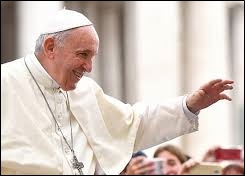OPINION | CHRISTIAN-JEWISH AFFAIRS | HISTORY | COLLABORATORS HONORED | BLAMING THE VICTIMS
by Andrius Kulikauskas
◊
Pope Francis’s two-day visit to Lithuania this weekend includes a symbolic stop at the Vilna Ghetto on his second day, September 23, at roughly 4 PM at Rūdininkai Square. On that day, 75 years ago, Nazi Germans liquidated the Vilna Ghetto, murdering some of its Jews in Paneriai Forest (Ponár), and moving the rest to concentration camps in Latvia, Estonia and Germany. Since 1994, it has been the National Day of Commemoration of the Genocide of Lithuania’s Jews. Now it will surely be linked in the Lithuanian psyche with this visit by Pope Francis, and perhaps some day, Saint Francis.
However, his visit is also a chance for him to make plain to the children of God our lack of empathy for Lithuania’s Jews. A very short detour to the “Vilnius Sports Palace” — and a heavenly nod by the Pope — would let us tear down that “Soviet temple”, resurrect the holy Jewish cemetery beneath it, and enjoy a symbol of Litvak and Lithuanian friendship forever. This brings to mind the detour Jesus made in Jericho, when two blind men called out, “Lord, have mercy on us, you son of David!” And Jesus halted the crowd.
“What do you want me to do for you?”
“Lord, that our eyes may be opened.”
Jesus, being moved with compassion, touched their eyes; and immediately their eyes received their sight, and they followed him. (Matthew 20).
Truth be told, a single sentence by Archbishop Gintaras Grušas would heal the blind. In Lithuania, a letter of support by any single one of the priests or nuns would, too. Protestant Pastor Michael Maass’s letter of June 10, 2015, and my own article of January 4, 2016, are loving examples of how many Catholics will stand up for Jews some day, as has Silvia Foti, a dedicated Catholic. My fellow Catholics, have mercy! Open our eyes to see your empathy! All will surely follow you!
There is a most injurious symbol, which will require no detour, but the Pope himself will come to, at the very center of Lukiškės Square, at the feet of where the Lenin monument once stood. It is a tiny cross! Step back, and you will see the words, “Memory and Respect. For Those Who Fought and Died For Lithuania’s Freedom Throughout the Ages.”
Step further back, and you will read the plaque which describes 100 relics placed underneath that “Centennial Circle”. You will find earth brought from the historic battlefields, starting with the Battle of Žalgiris (Grunwald). You will read about dozens of sites where anti-Soviet partisans died for Lithuania’s freedom. And towards the climax of this holy litany you will find:
No. 93: Earth from the site of the mass murder at Kaniūkai village, Vilnius region, where in 1944, Soviet terrorists murdered 38 people.
What is notable about this mass murder? It is the singular war crime that the Republic of Lithuania’s prosecutors conspired to question Jewish partisans about, not for justice, but for the political purpose of consoling so-called Lithuanian patriots. These Jews were not “partisans for a week” like the Lithuanian rebels of 1941. They were not “anti-Nazis in pro-Nazi uniforms”. These Jewish heroes were trapped in the ghetto, escaped from the ghetto, and fought the Nazis in the forest in 1942-1944. They fought like the best of our anti-Soviet “Brothers of the Forest” of 1944-1953, and they deserve the same respect, the same compassion, and in my judgement, the same amnesty. They should never be equated to the evildoers of the Holocaust who arrested, demeaned, abused, slaughtered and robbed their neighbors in 1941, leaving more than 200 mass graves..
This tiny little cross is a symbol that the Republic of Lithuania, the City of Vilnius, and the Catholic Church have ceded their moral authority. Who took it? The plaque makes it clear: Jonas Burokas, Honorary Chairman of LLKS — Lietuvos Laisvės Kovotojų Sąjunga (The Lithuanian Freedom Fighters Organization). This injury is especially hurtful when we know the history of the LLKS and the history of Lithuanian Catholic insensitivity.
Do we want to know history?
Why do we live in the darkness of ignorance? The darkness makes clear whether we want to see the light or not. Those who wish for light will see it when it comes, and those who wish for darkness will be blinded by it.
“I came into this world for judgment, that those who don’t see may see; and that those who see may become blind.”
“Are we also blind?”
“If you were blind, you would have no sin; but now you say, ‘We see.’ Therefore your sin remains.”
Let us read from the LLKS website about their heroes.
“In commemorating the 70th anniversary of the LLKS, we bow our heads before LLKS founders Vytautas and Zenonas Blynas, tortured to death in Soviet lagers, Klemensas Brunius, who was killed in a car accident which the KGB organized, Ignas Vylius, who was shot to death at Tuskulėnai manor, and Antanas Valiukėnas, whom the KGB arrested, never to be heard from.”
Brunius was the acting leader of the LNP, whose June 14-15, 1941 program’s second point was “delete Jews from life”. He was subsequently replaced by Leonas Virbickas, who gave a speech at the celebration of the conclusion of the Holocaust in Lithuania. Vylius was the leader of the party’s forces, the Iron Wolf, which ensured that genocidal killers like Šimkus were in charge of the battalions. Valiukėnas was Škirpa’s personal secretary and one of the editors of the LAF program which “revoked hospitality from the ethnic Jewish minority”. A careful moral analysis reveals distinctions. When Valiukėnas rode a bicycle through Žemaitija in July, 1941, and saw no Jews, he thought that Škirpa’s plan had succeeded, and they had all fled with the Soviet army. By 1942, he knew otherwise, and sent a bulletin to Sweden about the tragedy of their genocide.
◊
Zenonas Blynas, August 1, 1941: “Only by blood does the earth, sprinkled by the blood of its sons and daughters, start to give a bountiful harvest, and for the earth, the earth of the parentland, there is never too little blood. It soaks up the blood of friend and enemy, lover and betrayer, the one who sacrifices themselves and the ones who scream in horror. The earth is always thirsty for moisture. The earth is always hungry for bodies that will rot.” TEXT WAS REJECTED BY GERMAN CENSORS.
◊
We can appreciate Jonas Burokas’s hero, LNP General Secretary and LLKS Founder Zenonas Blynas, by reading his 700 page diary. It is the “dirt book” for understanding Lithuanian crimes against humanity. Let us contemplate the entry from December 7, 1941, where he documents his conversation with Jonas Pyragius, a leader in the genocide of Lithuania’s Jews.
“We were talking: the [LNP] leader [Virbickas], Pyragius, Jasiunskas and I. Pyragius came back from Russia; earlier he was somewhere near Danzig. According to him, we’re going in the wrong direction. He defended the shooting of the Jews. [The Germans] are forming an aviation squad — from Lithuanians. I say — as Lithuania’s contribution, with our colors? — No, but they will always feel as Lithuanians. Nobody will ever knock this out of their heart. Then why — I say — can we shoot Jews with our national colors, but in an honorable battle — no colors? That’s another issue. But the [Bolshevist] threat we face is all the same — [we must] unconditionally go now [with the Germans] — the Germans are shedding their blood for us.”
What happens when we simply forget a villain like Pyragius? On January 17, 2015, the portal panskliautas.lt reported that Panevėžys Bishop Emeritus Jonas Kauneckas consecrated a memorial plaque to Jonas Pyragius and nine other volunteer soldiers who fought in Lithuania’s War of Independence, 1919-1920. Daujėnai alderman Vladas Vitkauskas explained, “We didn’t want to leave the memorializing of this history to some ordinary house or stone, so we chose the church and churchyard.” Entrepreneur Pranas Kiznis, the General Director of Lietpak, donated 6,000 euros for the memorial.
In their dispute, Blynas and Pyragius both agreed on all of Lithuania’s Jews being killed. They differed however, on matters of principle, as Blynas had to explain to a confused person who thought Blynas might actually help save a Jew. One principle was that Lithuanians should demand and receive from the Germans a promise that after the war they would be granted independence in appreciation for their genocidal service.
On April 14, 1942, Blynas wrote a historic LLKS declaration, “Lithuanians!” If Hitler had won all the wars, and if he had believed that Lithuanians were Aryans, then we would be living by Blynas’s principles. It starts with a confession of genocide:
“In the beginning, the Nazis thought to liquidate the Jews and Poles (by our hands); and only afterwards to seize upon resettling Lithuanians. They thought that we quietly suffer their force and we will be obedient, the executioners of other nations. The Nazis are changing their plan. All of their attention is beginning to fall not on the Jews or Poles, but on the Lithuanians.”
It then rallies us, Lithuanians:
“Remember: A. Hitler does not like those who “lack character”. He despises the nations which have a slave’s spirit. Let us show the Germans that we are true Aryans —Lithuanians, not any worse than Teutons; let us show that we know how to defend our honor and our rights. We are Lithuanians, not farmhands nor slaves.”
And finally, it turns to our best friends forever:
“GERMANS, Recognize the Independence of the Republic of Lithuania; let us truly autonomously manage our land. Afterwards we will speak with you about the forms of collaborating, considering first of all that our fundamental interests not suffer, and we will try to harmonize our mutual interests.”
This is an example of the Lithuanian anti-Nazi underground press that Genocide Center’s chief historian Arūnas Bubnys writes about. He extols LLKS and its wordsmith, Zenonas Blynas. But in what sense is it anti-Nazi? Bubnys quotes the Nazis to explain:
“All of the newspapers call for complete independence for the state of Lithuania…”
As for Blynas, he notes:
“Apart from all that, in April, 1942, Z. Blynas wrote an appeal to the General Councillors and an open letter to the German General Commisar for Lithuania, Adrian Theodor von Renteln, which urged granting independence to Lithuania.”
I wrote to Arūnas Bubnys and he explained that this was an entirely different document. It would be interesting to see the one he found.
I spoke with Jonas Burokas by phone for 40 minutes. (That’s what moral authorities do.) I told him that I was personally moved by the biography of his brother, Edvardas Burokas, who I had read about in the April, 2018 issue of LLKS Varpas. The Soviets held him in lagers from 1953 to 1962 where he worked in the mine shafts. In the mines, he was eternally organizing rebellions and strikes and battling snitches and lackeys. He was active with Lithuanians, Ukrainians and others in a Freedom Fighters Organization. Later, in Lithuanian, he was active in the underground press, Varpas.
I was curious if this LLKS actually had anything to do with the other LLKS, which Burokas idolized and even speaks on behalf of. I knew from Vilutis’s memoirs that when Lithuania’s greatest organizer, engineer Klemensas Brunius, was in the Soviet lager, the Soviets put him in charge of building new mine shafts. They let him have a personal guard of 50 strong men! Burokas was surprised to learn this because his brother Edvardas was not building but destroying Soviet mine shafts.
There was also another LLKS in 1940 which the Soviets rounded up and which merged into LAF until LAF was shut down. Burokas also speaks on behalf of them. But he didn’t know any of the names of these heroes. In summary, Lietuvos Laisvės Kovotojų Sąjunga had three periods of activity, 1940, 1942-1944 and 1953 onward. You may notice that none of these have anything to do with the anti-Soviet “Brothers of the Forest” in 1944-1953 or even the 1941 rebellion. This points to the void in Lithuanian moral authority where nobody actually delves into history. Anybody can speak on behalf of Lithuania’s partisans.
Lithuanians have not been able to decide what to do with Lukiškės Square ever since they tore Lenin down. Finally, Burokas and LLKS personally organized some 300 people to gather 100 relics for the occasion of the centennial. These are the “Lithuanian Freedom Fighters of All Times”. Unable to get official state permission, on January 12, 2018, they simply took the initiative to place time capsules with 60 relics at the center of the square. On February 16, 2018, the centennial of Lithuanian independence, now with the permission of the state, they placed the remaining 40 relics.
Burokas explained that the victims of the massacre at Kaniūkai were included because they had been defending their village.
One complaint that Burokas and I both share is that Lithuania lacks a vibrant, free press. LLKS publishes Varpas. I can write at Defending History. That certainly was not possible in Soviet-occupied Lithuania. But we both feel that we lack access to Lithuania’s mainstream press. For example, the press has been writing about Jonas Noreika’s crimes as District Chief in Šiauliai, but nobody has yet dared to mention his leadership in killing about 3,000 Jews and 300 Lithuanians in Telšiai District, as documented by the Captain Jonas Noreika Museum and Archive.
The Pope will see Jonas Noreika’s memorial stone overlooking Lukiškės Square. Will he be told of Noreika’s victims in Telšiai District? 3,000 Jews and 300 Lithuanians. Photo: DefendingHistory.com.
◊
Pope Francis’s visit brings attention to Lithuania from a higher plane. Perhaps that may allow for other views as well, including Lithuania’s Jews who have endured not only the Holocaust, but hurtful insensitivity ever since. Perhaps the mainstream press and the Lithuanian Catholic press might seek a vibrant dialogue with a wide range of voices. Perhaps the LLKS might inspire us to take the initiative to tear down the Sports Center wall by wall, and revive the Jewish cemetery, tomb by tomb. I have a dream — perhaps we could all do that together.
◊
Andrius Kulikauskas is Curator of the Captain Jonas Noreika Museum and Archive.



